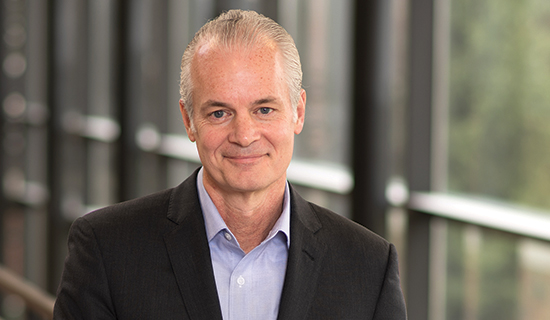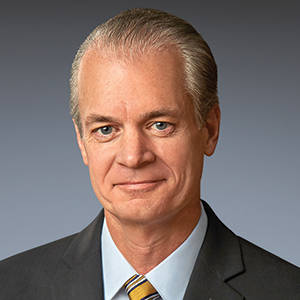Eric Schnur has taken crucial steps to stabilize Lubrizol Corp. in the midst of COVID-19.
Now the company is playing a lead role in protecting those serving on the front lines in this global pandemic.
“The real heroes in this whole fight are the medical professionals — doctors, nurses, EMTs — everybody that’s helping to treat the patients and save so many lives,” says Schnur, Lubrizol’s chairman, president and CEO. “Any way we can do our small part to help those people is a real honor for us.”
In April, the Berkshire Hathaway-owned company made a $2 million donation commitment to support COVID-19 needs globally. Lubrizol has enabled production of an additional 1 billion bottles of hand sanitizer every month by increasing its production of Carbopol polymers, a thickening agent found in most hand sanitizing gels and cleansing applications. Additionally, the company partnered with GOJO to donate more than 16,000 liters of Purell hand sanitizer to Northeast Ohio hospitals and contributed to Nike’s efforts to make full-face shields for frontline medical workers.
“We’re very focused on the external market, and we’ve rearranged a lot of our manufacturing assets to try to make more materials for medical devices and hand sanitizer components that are so important right now,” says Schnur. “There are some other products that we have basically deferred so that we can make more of the stuff people demand. We’re staying really close to our customers who are in those kinds of fields.”
While the fight against the pandemic continues, Lubrizol has also begun the gradual process of returning employees to their work sites.
“We had about 11,000 people in our sites globally at the end of February, and we pulled that down to about 4,200 over a two- to three-week period,” Schnur says.
That number has now increased past 5,000 and will continue to rise as safely as it can be done. The good news, he says, is that results thus far have proven there is no need to rush the process.
“We learned that we’re able to work remotely more readily than we might have ever envisioned,” Schnur says.
Establish clear priorities
Lubrizol was prepared for COVID-19. It developed a formal pandemic team in the early 2000s, and the initiative gained strength following the SARS outbreak of 2003. It has continued to evolve with MERS, swine flu, Ebola and Zika, among other infectious diseases.
“The No. 1 priority is to protect the health and safety of our employees,” Schnur says. “No. 2 is to make sure we’re able to continuously operate as a company, continue to supply our products to our customers and improve the processes we have and the breadth of considerations we take into account.”
Each event is an opportunity to learn and update procedures; preparation is not designed to anticipate or solve all of the problems you might face in a crisis.
“But when you get into a crisis situation, that’s when your priorities have to be really clear,” Schnur says. “You have to keep going back and asking yourself, ‘Are we doing everything we possibly can for our employees, for our customers and for our communities?’ At its essence, that’s what a company is. You have to be very clear about what you stand for as a company, what your priorities are, and stay true to those, no matter what’s going on in the outside world.”
This preparation contributed to a relatively seamless transition to a remote workforce when stay-at-home orders went into effect in March across most of the country and around the world.
“If you would have said to me six months ago that this is the way that your organization will be working, it would have been hard to envision,” Schnur says. “But we were well prepared and just took it step by step.”
The pandemic has shone a bright light on groups in the company that often don’t get a lot of attention.
“When your computer doesn’t quite do what you want it to do, that’s when you notice you have an IS group,” Schnur says. “Otherwise, when they’re being very effective, they’re almost in the background. But we’ve all grown to appreciate them significantly as we’ve been working in completely different environments.”
The key is to create pathways and an infrastructure that enable people to still feel like they’re part of the team.
“If people can still feel connected, there’s some semblance of normality despite the fact that there are so many things that are unusual about this,” Schnur says. “We’re being very thoughtful about trying to keep people as connected as we can. We do most of this over video. It’s not the same as sitting in a room with people and seeing their faces and being able to connect in that way. But it’s better than just a phone call or reading something in an email.”
Ready to serve
While many around the world have been pleasantly surprised by how effectively they can do their jobs from home, others have work that simply can’t be done anywhere else.
“If you’re working in a laboratory or you’re a research scientist or something like that, it may not be so easy to work from your study at home or your kitchen table,” Schnur says. “So we’ve encouraged people who can’t necessarily do their day jobs remotely to volunteer, and we count that as work time.”
It’s another way that Lubrizol has been able to keep people busy while also doing its part to fight COVID-19.
“We want to be a good neighbor wherever we operate,” Schnur says.
The company has also made contributions to food banks in all of its communities, as well as donations to local hospitals, in addition to the work that is done on the business side.
“We’re buying food from local restaurants, which have been really hard hit in this whole situation, and then we’re donating that food to the hospital workers,” he says. “So we’re helping two groups with that effort.”
Maintain lines of communication
When it comes to Lubrizol’s financial outlook for the rest of 2020 and into 2021, Schnur is taking a pragmatic approach.
“It certainly is going to reduce the business results of the company for this year, and nobody knows exactly where the bottom will be or exactly when we start to come back or exactly how long that’ll take,” he says. “We’re watching cash very closely. We’re doing everything that probably every other company is doing to try to manage through an uncertain time.”
Communication becomes even more important during a crisis, and Schnur is emphasizing regular dialogue with customers to understand how they are being affected by the pandemic.
“With some of our customers, we’re going to start to see a downturn, and we’re trying to stay very close to them so we understand how that downturn is going to go and adjust our inventory levels appropriately,” Schnur says. “Then probably just as important — more important maybe — we want to stay very close to them so when things start to come back, we’re able to be there in supply and make sure they have everything they need from us.”
In the meantime, it’s not a bad time to talk to customers about long-term projects and priorities that might have been on the table for discussion anyway.
“Depending on where people are, how they’re working, what their work environment looks like, they may have some time to spend on video calls thinking about how we best come out of this and how we continue to grow after business conditions return to a little bit more normal,” he says.
As much as Schnur has taken on a role of counselor during this time of crisis, he says his team has done the same for him. Lubrizol has established check-in meetings at the end of each week to get a sense for what’s happening throughout the organization.
“I think we’re all helping each other, and it’s not only our senior team; I see that across our organization,” Schnur says. “I have these calls of 50 people, and I’m on the line and I’m hosting, along with Ana Rodriguez, our chief human resources officer.”
Rather than manage the conversation, Schnur sometimes sits back and listen.
“Our people talk to each other and support each other with their comments and their questions and discussions,” he says. “It’s not so much a matter of hierarchy, it’s just a matter of helping each other get through a very unusual situation and do it in a way that we’re staying true to helping taking care of our people, our customers and communities.”
Schnur looks forward to the day when the pandemic is in the past and he can dive completely into the new innovations and next-generation technologies and products that he expects will be part of Lubrizol’s future.
“That’s all still got to continue to progress,” he says. “It’s just a matter of being very thoughtful and proactive about it, maybe even more so than we’ve been in the past. It’s making sure people remember their accountabilities and what they’re empowered to do, regardless of what situation they are working in.”
TAKEAWAYS
- Each experience is an opportunity to learn something new.
- Find ways to help, even when you’re in a tough situation.
- Never stop thinking about what your company needs to do in the future.
NAME: Eric Schnur
TITLE: Chairman, president and CEO
COMPANY: Lubrizol Corp.
Education: Bachelor of science degree, chemical engineering, Penn State University; MBA, Case Western Reserve University
Schnur on working remotely: Just like we have to be very proactive and thoughtful about connecting with each other within the company, we’re doing the same thing as we think about our customers, think about our other partners or suppliers. Most of those people are working remotely, as ours are. It’s a whole different situation.
It’s not the same. But if you’ve got a relationship with somebody, you can continue to be very effective, even remotely, for some period of time. I don’t think we could envision doing this really effectively for years and years. But you can operate very effectively for quite some time, and our customers, our suppliers and our partners are all in the same situation. I think we’re learning from each other.
Vast experience: Schnur has held a variety of positions across numerous product lines within Lubrizol, including technical and commercial roles, product manager, global business manager, vice president and general manager, and president of Lubrizol Advanced Materials. Most recently, he was president and COO prior to assuming his current role in January 2017. Throughout his career with Lubrizol, he has also worked at several company facilities, including the Lubrizol Additives site in Singapore, where he led engine oils marketing and technical services for Southeast Asia and Australia.


